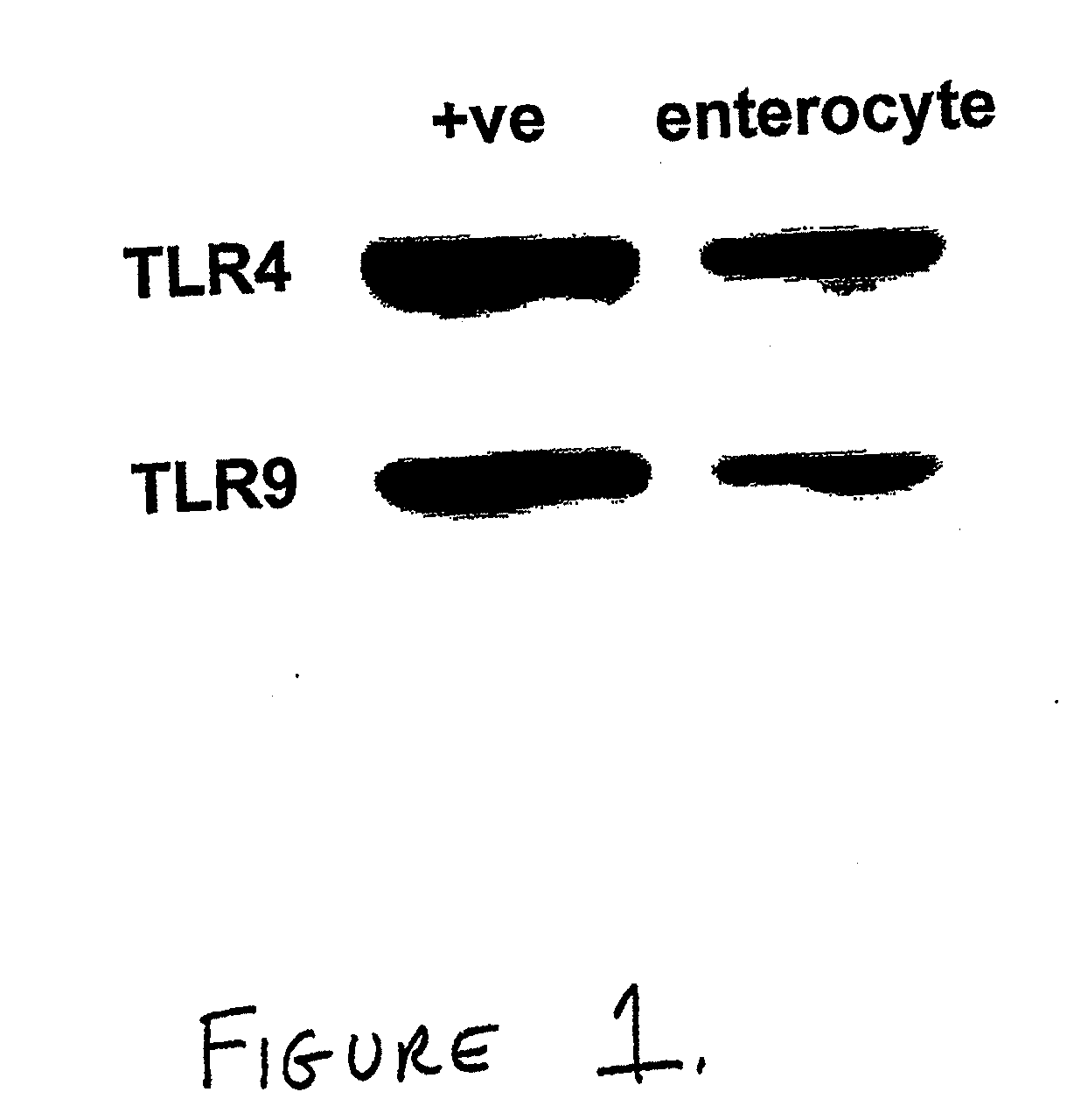Use of toll-like receptor-9 agonists, toll-like receptor-4 antagonists, and/or nuclear oligomerization domain-2 agonists for the treatment or prevention of toll-like receptor-4-associated disorders
a technology of toll-like receptor and nuclear oligomerization domain, which is applied in the direction of antibacterial agents, peptide/protein ingredients, antibacterial agents, etc., can solve the problems of multi-system organ failure, systemic sepsis, and death, and achieve significant protection against the development of necrosis, reduce inflammation, and reduce tlr4-mediated signaling
- Summary
- Abstract
- Description
- Claims
- Application Information
AI Technical Summary
Benefits of technology
Problems solved by technology
Method used
Image
Examples
example 1
6. EXAMPLE 1
[0094]Both TLR4 and TLR9 were demonstrated on the surface of enterocytes from mice and humans. FIG. 1 and FIG. 2A show Western blots depicting expression of TLR4 and TLR9 in positive control cells and enterocytes from C57 / B16. FIG. 2B shows an image from an immunofluorescence study demonstrating expression of TLR4 and TLR9 in murine intestine. FIG. 3 shows the results of a comparable immunofluorescence study performed using intestine from human neonates.
[0095]Experiments were performed to validate a model for the etiology of NEC, where, in the context of physiologic stressors such as hypoxia, infection, and / or prematurity, bacterial DNA and endotoxin from lumenal bacteria can activate TLR4 as well as suppressor pathways involving TLR9 (FIG. 4). A variety of molecules may be used to measure the activation level of TLR4, including MAP kinases such as p38 and ERK and NFκB or its subunits, p65 or p50 (FIG. 5).
[0096]A first series of experiments was designed to study the cons...
example 2
7. EXAMPLE 2
[0103]Materials and Methods
[0104]Cell culture and reagents. IEC-enterocytes and J774 macrophages were obtained from the American Type Culture Collection (ATCC, Manassas, Va.). Phosphorothioated CpG-DNA, oligodeoxynucleotide (ODN) 1826 (TCCATGACGTTCCTGACGTT) (SEQ ID NO:6), and control GpC-DNA, control ODN 1826 (TCCATGAGCTTCCTGAGCTT) (SEQ ID NO:9), were synthesized by the University of Pittsburgh DNA synthesis facility. ODNs were confirmed to be endotoxin-free by Limulus assay. Antibodies were obtained as follows: TLR4; TLR9-Imgenex, San Diego, Calif.; NFkB (p65 subunit)-Santa Cruz Biotechnology, Santa Cruz, Calif.; cleaved caspase-3, phospho-p38-MAPK, phospho-ERK, total p38-MAPK, and total ERK-Cell Signaling Technology, Beverly, Mass.
[0105]Induction of necrotizing enterocolitis. All mice were housed and cared for at Rangos Research Center, Children's Hospital of Pittsburgh. All experiments were approved by the Children's Hospital of Pittsburgh Animal Care Committee and th...
example 3
8. EXAMPLE 3
[0113]NOD2 expression in the intestine is reduced in human and experimental necrotizing enterocolitis. In order to define the molecular mechanisms that lead to the development of NEC, a newborn mouse model of this disease was developed that parallels the findings seen in human NEC (Leaphart et al., 2007, J. Immunology 179:4808-4820; Leaphart et al., 2007, Gastroenterology 132:2395-2411; Cetin et al., 2007, Am J Physiol Gastrointest Liver Physiol 292:G1347-1358). As is shown in FIG. 22A-I, newborn mice were randomized to be either breast-fed (“control”, panels A, B) or gavaged with formula (Canine-Simialac 70%, water 30%) three times daily and subjected to 2 minutes of hypoxia (5% O2) in a Modular Incubator Hypoxic Chamber (Billups-Rothenberg) three times daily prior to each feeding (“NEC”, panels C, D). Animals were killed on day 4 and the distal 2 cm of terminal ileum was harvested for histological and molecular analysis. The histological and gross appearance of the ile...
PUM
 Login to View More
Login to View More Abstract
Description
Claims
Application Information
 Login to View More
Login to View More - R&D
- Intellectual Property
- Life Sciences
- Materials
- Tech Scout
- Unparalleled Data Quality
- Higher Quality Content
- 60% Fewer Hallucinations
Browse by: Latest US Patents, China's latest patents, Technical Efficacy Thesaurus, Application Domain, Technology Topic, Popular Technical Reports.
© 2025 PatSnap. All rights reserved.Legal|Privacy policy|Modern Slavery Act Transparency Statement|Sitemap|About US| Contact US: help@patsnap.com



